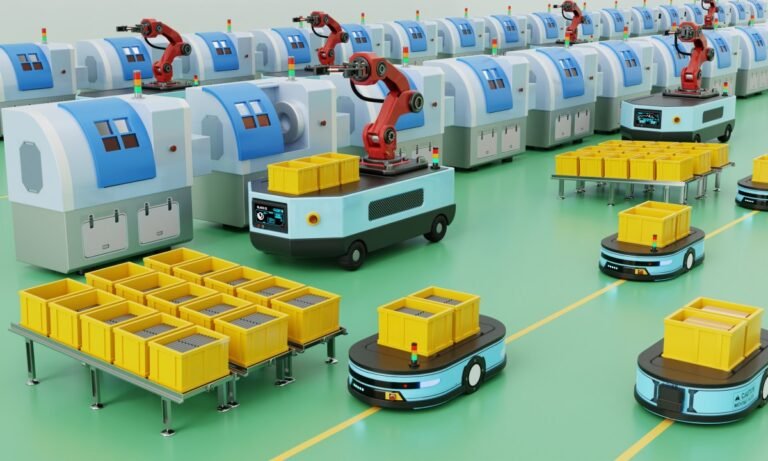
In the short term, many employers have complained of an inability to fill roles and retain workers, further accelerating robotic adoption.
One aspect of the conversation that is oft neglected, however, is how human workers feel about their robotic colleagues.
But could the technology also have a negative impact on worker morale?
The institute reports a negative impact to worker-perceived meaningfulness and autonomy levels.
As long as robots have a positive impact on a corporation’s bottom line, adoption will continue at a rapidly increasing clip.

Google has terminated the employment of 28 employees following a prolonged sit-in protest at the company’s Sunnyvale and New York offices.
The protests were in response to Project Nimbus, a $1.2 billion cloud computing contract inked by Google and Amazon with the Israeli government and its military three years ago.
So many workers don’t know that Google has this contract with the IOF [Israel Offensive Forces].
Those of us sitting in Thomas Kurian’s office repeatedly requested to speak with the Google Cloud CEO, but our requests were denied.
Hundreds and thousands of Google workers have joined No Tech for Apartheid’s call for the company to Drop Project Nimbus.

Working from home isn’t going away, even if some CEOs wish it would Most workers crave flexibility and work-life balanceWhen I started working from home in the late 1980s as a freelance technical writer, I was clearly an outlier.
Today, 14% of U.S. workers work at home full time (including me), and that number is expected to increase to 20% by next year, according to data published by USA Today.
Wayfair, the Boston-based online furniture company, concentrated on remote workers over in-office folks in a layoff earlier this year, according to a WSJ report.
Meanwhile Michael Bloomberg suggested remote workers weren’t actually working, but playing golf (which honestly sounds like projecting to me).
That’s a lot of executive energy being directed against working from home and toward working in the office.

The round also includes existing investors, Notable Capital, Bain Capital Ventures, Khosla Ventures, Cowboy Ventures and PLUS Capital.
“To have over 2 million workers on Homebase, which is over 2% of the workforce, is impressive for a private company,” Richards said.
In 2021, sources told TechCrunch’s Ingrid Lunden that the company’s valuation was between $500 million and $600 million.
“We are using technology to give workers superpowers and in fact, make the work more human, not less,” Waldmann said.
Small businesses have always provided that, and this, to me, is why our mission is so important to make these jobs even better.”

A few years ago, Darren Shimkus, ex-president of Udemy, had a conversation with Dennis Yang about skills building.
Modal provides personalized technical skills training for a company’s staff, offering on-demand coaching and a pedagogical approach that groups users into semi-structured online learning communities.
First, Shimkus says, by honing in on hot trends: data and AI.
“The rise of AI is bringing more visibility to data teams than ever before,” Shimkus said.
“It’s hard in today’s ever-changing workplace landscape to predict what your teams need, meaning most leaders don’t have a reliable way to plan for and improve their team’s skills.

Seso was founded five years ago to help streamline that process and now looks to expand into a one-stop-shop HR platform for the agriculture industry.
Michael Guirguis co-founded the startup after his cousin asked for his advice on whether or not her organic farm should expand.
Once he started talking to potential farm customers, he realized that farms could use a lot more help with their HR beyond just finding workers.
“When it comes to the back office, every farm we visited had thousands of filing cabinets,” Guirguis said.
“Your HR team is in the back office doing traditional HR work,” Guirguis said.

The platform, formerly Twitter, is working on an addition to its Communities feature that would let X users create groups for X-rated material, according to app researchers.
pic.twitter.com/Sou18ze7Va — Nima Owji (@nima_owji) February 28, 2024Twitter introduced its Communities feature in 2021.
So, the platform’s more-lenient policy on adult content is critical for online sex workers to grow their businesses.
Adult creators are allowed to post explicit content on X, though they can’t monetize it on the platform.
Even though X seems to be working on this NSFW Communities feature, that doesn’t mean it’ll come to fruition.

Alex Chatzieleftheriou founded Blueground in 2013 after being frustrated with the dearth of short-term furnished apartments in Europe.
In 2022, the company gained a strong foothold in Latin America by buying Tabas, an operator of over 9,0000 furnished apartments in Brazil.
Blueground leases apartments in popular neighborhoods and then equips and furnishes them for renters.
The company didn’t reveal its new valuation, but Chatzieleftheriou said that the company’s value has increased since its previous round.
Sales jumped by 70% to $560 million in 2023 over 2022’s $300 million in gross revenue, Chatzieleftheriou said.

Startups are hiring fewer workers, and paying out less in equity compListen here or wherever you get your podcasts.
Hello, and welcome back to Equity, the podcast about the business of startups, where we unpack the numbers and nuance behind the headlines.
This is our Wednesday episode, in which we dig into critical startup news to stay abreast of what founders and venture capitalists are working on.
Today on the podcast, we got through the following:

Naturally, I jumped at the opportunity to take Verve Motion’s SafeLift Exosuit for a spin.
You put it on over your shoulders and then snap yourself in with a pair of chest straps.
Next, another pair of soft straps are stretched around your thighs and Velcro-ed in place.
The thigh straps are connected to a pair of soft fabric cables that retract into the backpack with a bit of a yank.
Verve Motion sells SafeLift as part of a larger system featuring a wall of lockers/cubby holes used to store and charge the exosuits.













